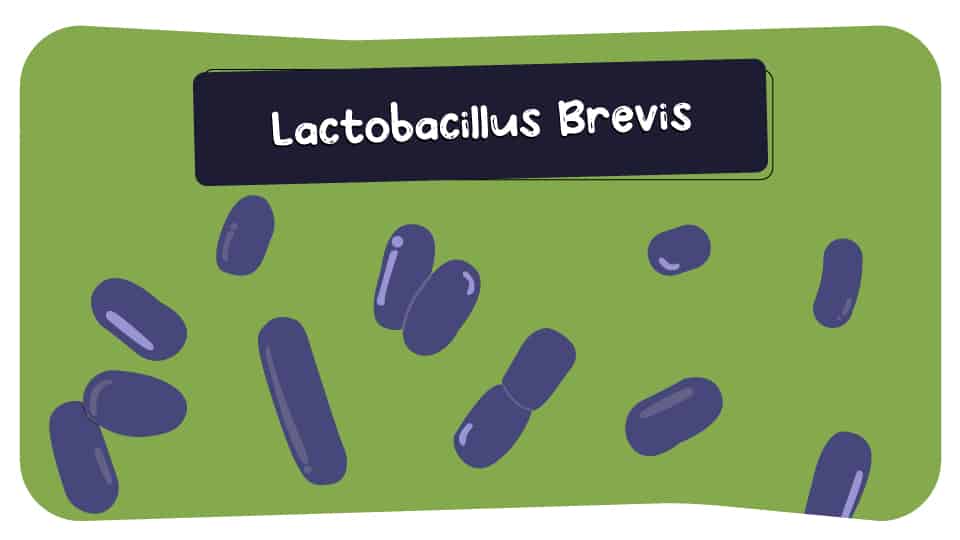3 Lactobacillus Brevis Health Benefits: Cognition, Oral and Digestive

Lactobacillus brevis, a gram-positive, rod-shaped bacteria, belongs to the lactic acid bacteria family. While its precise origin remains elusive, it was first identified by microbiologist August Gärtner, with historical records dating back to 1894.
1. Improves Cognitive Function
Cognitive function refers to the mental processes and abilities that enable us to perceive, think, reason, remember, and make decisions, allowing us to process and understand information in our environment.
A 2019 study authored by R Ishikawa, found that dietary consumption of heat-killed Lactobacillus brevis SBC8803 improved hippocampus-dependent memory performance and enhances adult hippocampal neurogenesis in mice.
Mice fed a diet containing the L. brevis probiotic, showed improved memory in social recognition and contextual fear conditioning tasks, along with an increase in the survival of newborn neurons in the adult hippocampus. The hippocampus plays a crucial role in the brain for the formation of new memories and spatial navigation.
2. Improves Periodontal Disease
Periodontal disease is a chronic inflammatory condition of the gums and supporting structures of the teeth, often characterized by gum tissue inflammation, gum recession, and loss of tooth-supporting bone.
A 2007 study titled "Anti-inflammatory effects of Lactobacillus brevis (CD2) on periodontal disease" found that lactobacillus brevis-containing lozenges demonstrated anti-inflammatory effects in patients with periodontal disease.
Anti-inflammatory effects in patients with periodontal disease are beneficial because they help reduce gum tissue inflammation and prevent further damage to the teeth and supporting structures, ultimately improving oral health and preventing tooth loss.
The probiotic lozenges led to significant improvements in clinical parameters such as gingival inflammation, plaque, calculus, temperature sensitivity, and bleeding on probing. Oral nitric oxide synthase activity, a key inflammatory mediator, was markedly reduced after treatment.
3. Improves Constipation
Constipation is a condition characterized by infrequent and difficult bowel movements, often resulting in the passage of hard, dry stools.
A 2013 study authored by N Suzuki, found that enteric-coated tablets containing lactoferrin and heat-killed Lactobacillus brevis subsp. coagulans increased the frequency of defecation in Japanese women with a tendency for constipation.
The tablets led to a significant increase in the number of beneficial bifidobacteria in their feces. In vitro experiments also showed that Lactoferin and its tryptic hydrolysate promoted the growth of Bifidobacterium longum probiotic bacteria. Bifidobacterium longum is a species of beneficial bacteria commonly found in the human gastrointestinal tract.
What Is Lactobacillus Brevis LBR-35?
Lactobacillus brevis LBR-35™ is a specific strain of Levilactobacillus brevis, a type of bacteria found in the human gut. A 2021 study authored by S Banerjee, focused on gamma-aminobutyric acid production by different bacterial strains and L. brevis LBR-35 was found to have a genetically similar GABA-producing system compared to L. brevis Lbr-6108.
What Foods Have Lactobacillus Brevis?
Lactobacillus brevis is commonly found in various fermented foods such as kefir, sauerkraut, pickles, cheese, and sourdough bread.
Fermented foods are food products that have undergone a natural preservation process involving the action of microorganisms like bacteria, yeast, or molds, resulting in changes to the food's flavor, texture, and nutritional profile.
Dr. Sara Mesilhy has a Master’s degree in Gastroenterology and holds a membership with the Royal College of Physicians of the United Kingdom. She completed her Bachelor of Medicine, Bachelor of Surgery (MBBS) at Cairo University and is currently part of the ProbioticReviewGirl medical team.